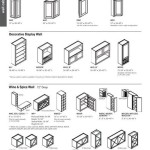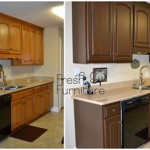Adding Kitchen Cabinets Above Existing: A Comprehensive Guide
Enhancing your kitchen's storage and functionality can be as simple as adding new cabinets above your existing ones. This practical approach not only boosts storage capacity but also creates a more visually appealing and cohesive space. Here's a comprehensive guide to help you approach this project with confidence:
1. Planning and Measurements
Begin by carefully measuring the space above your existing cabinets to determine the dimensions of the new ones. Ensure adequate clearance for appliances, open doors, and countertop space. Consider the height and depth of the cabinets, as well as the overall aesthetic you wish to achieve.
2. Cabinet Selection
Choose cabinets that complement the design and finish of the existing ones. Consider style, color, and material to ensure a seamless transition. Ensure that the new cabinets have the same depth as the lower ones for a cohesive appearance.
3. Wall Reinforcement
For heavier cabinets or those containing significant weight, reinforcing the wall is crucial to ensure stability. This may involve adding additional studs or blocking between existing ones. Use a stud finder to locate the studs and drive screws or nails to provide added support.
4. Installation
Securely fasten the new cabinets to the reinforced wall using screws or nails. Use a level to ensure proper alignment and prevent sagging. Connect the cabinets to each other using brackets or cleats for added stability.
5. Frame and Doors
Install the cabinet frames and doors to complete the installation. Align the doors carefully and adjust the hinges for smooth opening and closing. Use a drill and screws to secure the handles or pulls.
6. Trim and Moldings
Optional trim and moldings can enhance the aesthetic appeal of the new cabinets. Install crown molding along the top to create a polished look, while toe kicks along the bottom can conceal gaps and add a decorative touch.
7. Finishing Touches
Complete the project by painting or staining the cabinets if necessary. Add shelves, drawers, or other storage organizers to maximize the functionality of the new space. Consider under-cabinet lighting to illuminate work surfaces and enhance the overall ambiance.
Additional Tips:
- Use a hydraulic lift to support heavy cabinets during installation.
- Drill pilot holes to prevent splitting before inserting screws or nails.
- Seal all joints with caulk to prevent moisture damage.
- Securely fasten all hardware, including hinges and handles.
- Consider adding glass doors or inserts to showcase special dishes or glassware.
Adding kitchen cabinets above existing ones is a rewarding project that can transform the functionality and aesthetics of your space. By following these steps and considering these additional tips, you can achieve a seamless and professional-looking result that enhances your kitchen experience for years to come.

Diy Stacked Kitchen Cabinets Frills And Drills

Adding Small Cabinets Above Existing Kitchen Google Search Decor Upper

Tall Kitchen Cabinets How To Add Height The Honeycomb Home

Extending Kitchen Cabinets To Ceiling American Wood Reface

Tall Kitchen Cabinets How To Add Height The Honeycomb Home

Extending Kitchen Cabinets Up To The Ceiling Thrifty Decor Diy And Organizing

Closing The Space Above Kitchen Cabinets Remodelando La Casa

Diy Stacked Kitchen Cabinets Frills And Drills

Extending Kitchen Cabinets To Ceiling American Wood Reface

Adding Small Cabinets Above Existing Kitchen Google Search Remodeling Projects Makeover Diy
Related Posts








